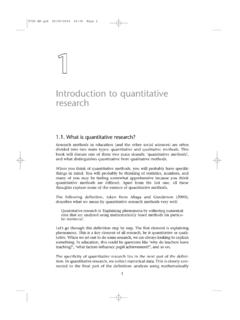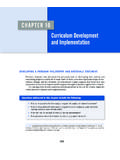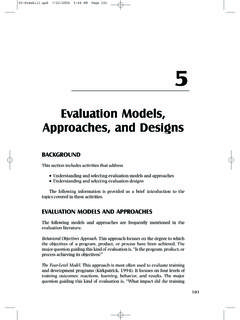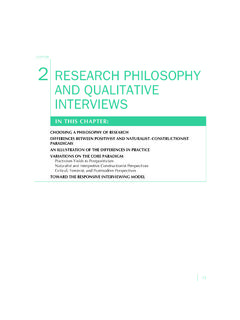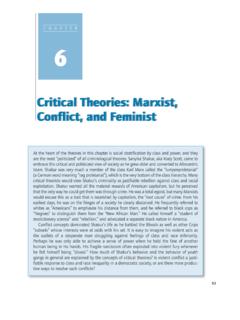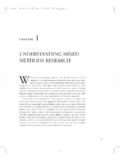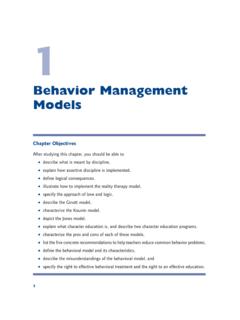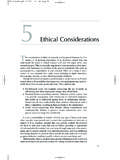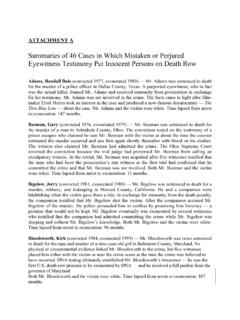Transcription of The Importance of Ethics in Criminal Justice
1 1 The Importance ofEthics in Criminal Justice3To live ethically is to think aboutthings beyond one s own I think ethically I becomejust one being, with needs anddesires of my own, certainly, butliving among others who alsohave needs and desires. Peter Singer 1995: 174 THE MEANING OF ETHICSE thics, also known as moral philosophy, is abranch of philosophy concerned with thestudy of questions of right and wrong andhow we ought to live. Ethics involves makingmoral judgments about what is right orwrong, good or bad. Right and wrong arequalities or moral judgments we assign toactions and conduct. Within the study ofethics, there are three branches: metaethics,concerned with methods, language, logicalstructure, and the reasoning used in the inter-pretation of ethical terms, for example, whatexactly does the term good mean; normativeethics,concerned with ways of behaving andstandards of conduct; and applied Ethics ,con-cerned with solving practical moral problemsas they arise, particularly in the professions,such as medicine and provides us with a way to makemoral choices when we are uncertain aboutwhat to do in a situation involving moralissues.
2 In the process of everyday life, moralrules are desirable, not because they expressabsolute truth, but because they are generallyreliable guides for normal circumstances(Singer 1995: 175). The focus of this book ison normative and applied Ethics , particularlythe exploration and analysis of ethical dilem-mas and conflict situations that arise withinthe Criminal Justice VALUE OF ETHICSDo we need to study Ethics ? One view is thatif we need to make a decision about a 1/30/04 2:41 PM Page 3that confronts us, we can do so without anyknowledge of Ethics . From this perspective, Ethics is too abstract and theoretical and isnot related to the practical world. Anotherview is that we need a system of rules andprinciples to help guide us in making difficultdecisions when moral issues arise.
3 If we cannotdraw upon an ethical framework, we haveto rely on emotion, instinct, and personalvalues, and these cannot supply an adequateanswer to moral dilemmas. Among the rea-sons commonly given for studying Ethics arethe following: Ethical considerations are central to decisionsinvolving discretion, force, and due processthat require people to make enlightenedmoral judgments. Knowledge of Ethics enables a person toquestion and analyze assumptions that aretypically not questioned in areas of activitylike business and politics. Questioning thecriminal Justice system should also be encour-aged. This includes raising issues regardingsuch topics as the relationship between crimeand Justice , the role of law enforcement, theplace of punishment, the limits of punish-ment, the authority of the state, the properfunction of prisons, fairness in the workplacethrough creating a safe working environ-ment, and equal opportunity.
4 The study of Ethics increases sensitivity toissues of right and wrong and the right wayto conduct oneself, and aids in identifyingacts that have a moral content. Only through studying Ethics is it possible todefine unethical behavior. A full understand-ing of ethical behavior demonstrates that itincludes not only bad or evil acts, butalso inaction that allows bad or evil tooccur. It is important to have the capacity topoint to moral reasoning in justifying behav-ior, and the study of Ethics develops thatcapacity. It is crucial that ethical decisions are made,and the study of Ethics enables the develop-ment of tools that enhance ethical decisionmaking. Training in critical Ethics helps to developanalytical skills and reasoning abilitiesneeded to understand the practical as well asthe theoretical aspects of the Criminal justicesystem (Felkenes 1987).
5 Understanding Ethics enables an appreciationof the complexities of acts that involve ethi-cal issues and dilemmas. Without knowledge of Ethics , Criminal justiceprofessionals may be na ve about moralissues occurring within the Criminal justicesystem. The study of Ethics helps Criminal Justice pro-fessionals quickly recognize the ethical conse-quences of various actions and the moralprinciples involved. Within the Criminal Justice system, Ethics isgermane to most management and policydecisions relating to punishment and is therationale used in making these decisions,such as whether to rehabilitate, deter, orimpose just deserts. Examples of such man-agement and policy issues include whether itis ethical to force someone to attend a treat-ment program against his or her will, and,given that the system of punishment is basedon rehabilitation, whether it is ethical to sendan offender to jail and not offer treatmentprograms to help him or her change behaviorin order to regain freedom (Felkenes 1987).
6 The Criminal Justice system comprises profes-sionals who exercise power and authorityover others, and who in some cases areauthorized to use force and physical coercionagainst them. The law, or accepted standardsof behavior, impose ethical rules and respon-sibilities on these professionals. It followsthat professionals in the Criminal Justice sys-tem must be aware of ethical standards incarrying out their functions. Ethics is crucialin decisions involving discretion, force, anddue process, because Criminal Justice profes-sionals can be tempted to abuse their powers(Felkenes 1987).In this book, the value of the study of ethicsby Criminal Justice professionals will becomeapparent as the Criminal Justice system is ana-lyzed to reveal how decision makers some-times fail to make the right choices, or4 Ethics AND THE Criminal Justice 1/30/04 2:41 PM Page 4deliberately act unethically in carrying outtheir functions.
7 It will become clear that study-ing and applying Ethics is a prerequisite forany competent Criminal Justice an introduction to the kinds of ethicalissues that can arise in Criminal Justice , tworeports of Criminal cases are presented in thefollowing Importance of Ethics in Criminal Justice5 CASE STUDY BRUTALITY IN NEW ORLEANSIn March 1990 Adolph Archie, an African American, was injured in an incident inwhich police claimed he shot and killed a white police officer during a downtownshootout. Archie was later to die himself in circumstances that are still far from Archie to the hospital after the shooting took police 12 minutes, but thedistance was only 7 blocks. When he arrived about 100 officers were present, hav-ing heard about the death of their fellow officer.
8 While Archie was being taken to thehospital, police radios were used to utter death threats against him, and thoseaccompanying him to the hospital believed there might be a lynching if he weretaken there. According to their account, they decided not to take him to that hospi-tal, and instead of taking him to a different hospital, they took him to the policestation where the deceased officer had worked. Here, officers reported there was ascuffle involving Archie and he fell, causing blood stains on the floor. However, thesergeant at the police station denied seeing either Archie or the officers and did notask about the blood stains, but simply ordered that they be cleaned up. When Archie finally got medical treatment it was clear that he had been severelybeaten, but no officers were held responsible.
9 At the hospital, Archie s X rays of hisinjuries disappeared, and staff were unable to record details of Archie s name andbackground. He was injected with iodine, to which he was alleged to be allergic, fora medical test, and some concluded that this was the cause of his death. However,other accounts by pathologists reported that he had been beaten to his death was reported as a homicide by police intervention by thecoroner. Within hours of his death, police Superintendent Warren Woodfork clearedall officers involved in the incident of any violations of conduct. Reportedly, therookie officer who arrested Archie was pilloried by fellow officers for not killingArchie on the , in May 1993, a report by the advisory committee on human rela-tions found that some officers had brutalized Archie, and that the department hadfailed to hold them accountable.
10 The committee noted the existence of a police codeof silence that was supported at the highest levels within the :Human Rights Watch, It was not until three years after Archiewas beaten to death that reports concludedthat some officers had behaved the extreme circumstances of thiscase, no police officers were prosecuted orsanctioned administratively, largely due to thepolice code of silence, a part of the institu-tional culture of the police (see Chapter 2). 1/30/04 2:41 PM Page 5 However, it is significant that the officerstransporting Archie did not enter the hospitalbut instead took him to the police is supposed to have slipped and fallenat the police station, and by the time he didreceive medical treatment, he had beenseverely beaten to such an extent that he diedas a result of what was termed a homicide bypolice intervention.


